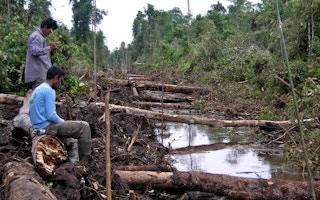After a year in which it destroyed over 1,000 hectares of peat swamp forest in violation of its own sustainability policy, palm oil giant Felda Global Ventures said it would “endeavor to rehabilitate” the damaged lands in Indonesian Borneo.
In August 2016, FGV promised to stop clearing rainforests and swampy peatlands. But on the ground, it continued to plow through the carbon-rich environments, creating space for its oil palm plantations.
In doing so, FGV violated not only its own green pledge, but also its obligations as a member of the Roundtable on Sustainable Palm Oil (RSPO), the world’s largest association for ethical production of the commodity, found in everything from chocolate to laundry detergent.
“This is the first time a palm oil company has been forced by its customers to restore the forest it cleared,” Greenpeace Southeast Asia forest campaigner Bagus Kusuma said in a statement.
FGV, which calls itself the world’s largest palm oil producer, is listed on the Bursa Malaysia, while the Malaysian government holds a one-third stake.
FGV’s transgressions had been highlighted by watchdogs Greenpeace and Chain Reaction Research in April and July.
Two of FGV’s Indonesian units — PT Temila Agro Abadi (TAA) and, to a far lesser extent, PT Citra Niaga Perkasa (CNP), both in Landak district, West Kalimantan province — had cleared over 1,000 hectares (3.86 square miles) of forest and peat since August 2016, according to the reports.
Following these findings, FGV said in a statement last month that it had “permanently discontinued…the land development work” in both concessions, and amended its previous sustainability policy by promising not to develop peat “irrespective of when the lands are acquired or owned by FGV group.”
“
The company must however realise that this commitment is easier made than fulfilled. With everyone’s eyes on this case, the pressure is on.
Wakker, director of corporate sustainability transformation, Aidenvironment Asia
That means it won’t clear peat in areas it was licensed to develop before it issued the commitment.
FGV also said it would “endeavor to rehabilitate” the peatlands it had planted since it issued the commitment in August 2016.
It did not note the extent of area it intends to restore, but Eric Wakker, a member of the Chain Reaction Research team, said the company had cleared over 1,000 hectares since then.
The land clearing appears to have violated not only FGV’s own policy but also that of the RSPO. FGV joined the association last December.
“In respect of the peat lands which have been developed at PT TAA and PT CNP, FGV will use RSPO’s land rehabilitation guideline as guidance and will consult Indonesia’s Peat Restoration Agency on the course of actions to be taken to implement the rehabilitation program,” the company said.
Wakker, who is also director of corporate sustainability transformation at environmental consultancy Aidenvironment Asia, called it “the most ambitious peat rehabilitation commitment made by any RSPO member so far.”
“The company must however realise that this commitment is easier made than fulfilled. With everyone’s eyes on this case, the pressure is on,” he wrote in an email.
Greenpeace called on the companies that buy palm oil from FGV — including refiners Wilmar International and Musim Mas, and consumer goods giant Unilever — to halt their purchases until the Malaysian firm provides “credible proof” that restoration is underway.
“Making commitments is the easy part,” Greenpeace’s Kusuma said. “[FGV] must now draw up and implement a time-bound action plan to deliver on today’s promises.”
The RSPO is investigating the allegations against FGV, according to RSPO communications chief Stefano Savi.
“The case is still being deliberated upon…and an on-site verification is in the plans at the moment,” Savi wrote in an email. “The complaints desk and the technical team are in discussion with FGV in taking this matter forward.”
RSPO members that break the rules of the association are supposed to pay compensation, although no system has ever been worked out for implementing that, despite the raft of violations.
Chain Reaction Research expressed optimism that FGV would become the first palm oil company to have to do so, it said in a statement.
Since last December, the Indonesian government has also banned all new development of peatlands, to prevent another disastrous outbreak of haze-causing wildfires. Wakker said the government had been notified about the allegations against FGV.
On the sidelines of an event in Jakarta, Bambang Hendroyono, secretary general of the Indonesian Ministry of Environment and Forestry, did not indicate he was aware of the case, but said he was committed to ensuring that plantation companies abide the rules.
“No matter who does it or where it happens, our stance is clear: to comply with our peatland regulation,” he said last week.
This story was published with permission from Mongabay.com










